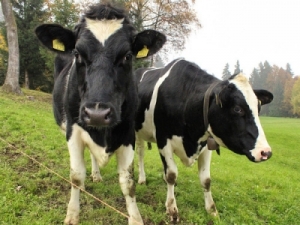DairyNZ opens applications for associate director role
DairyNZ is giving New Zealand farmers a unique opportunity to gain hands-on governance and leadership experience within the dairy sector.
 The attitude schools hold towards agriculture needs to change to encourage teachers to promote it as a great career choice – especially by young Maori.
The attitude schools hold towards agriculture needs to change to encourage teachers to promote it as a great career choice – especially by young Maori.
DairyNZ's Maori development manager Tony Finch says the industry needs to help cause a paradigm shift.
The attitude schools hold towards agriculture needs to change to encourage teachers to promote it as a great career choice – especially by young Maori.
Research funded by Primary Growth Partnership shows that 9% of the dairy workforce is Maori, and 25% of workers who leave the industry every year are Maori, versus 15% who are non-Maori.
Finch believes that overall Maori are quite well represented in the dairy industry, but says as Maori aspire to make more use of their land, more young Maori will be needed.
The reasons for Maori not taking up careers in dairying are no different from those of non-Maori, he says.
"I don't think it's any different from the local population's view of dairying. It is not a great perspective; it's generally thought to be an isolated job away from the urban areas and this generation doesn't like that much," Finch told Rural News.
"There is a perception of long hours and dirty work and for all those reasons dairying doesn't come across as the most attractive career option."
Finch says when he was at school agriculture was seen as the career choice for 'dummies' and says there are now many initiatives to change the perception school teachers have of agriculture. Teachers are still as influential in forming young people's career choices as they were in his schooldays.
"They need to understand that agriculture is not just hands-on physical work, but covers sciences, finance and a raft of great, exciting and rewarding careers," Finch adds.
"Dairying is quite a different beast these days with technology and the way sheds are designed and the land farmed. There's a need to improve the perception and make people aware of what is happening in the industry."
Finch says for young Maori there are lots of opportunities as Maori set about pooling resources and creating larger, more economic farming units.
"There is a lot of land sitting idle which can be developed and improved and dairy is an opportunity in waiting. As well, there is still a huge amount of productive capability sitting in the industry.
"While there are many great Maori farms, a large number still operate below the industry average productive capability. That often comes down to people capability, so there is a need to get people with the right skills to run a business."
Finch says part of the solution is promoting leadership within Maori youth. He says the Young Maori Farmer of the year competition, run in conjunction with the Ahuwhenua Awards, is one such successful mechanism.
The World Wide Sires National All Day Breeds Best Youth Camp Best All Rounder plaudit has become family affair, with 2026 Paramount Cup winner Holly Williams following in her sister Zara's footsteps.
DairyNZ is giving New Zealand farmers a unique opportunity to gain hands-on governance and leadership experience within the dairy sector.
Herd improvement company LIC has posted a 5.2% lift in half-year revenue, thanks to increasing demand for genetics.
According to the latest Fresh Produce Trend Report from United Fresh, 2026 will be a year where fruit and vegetables are shaped by cost pressures, rapid digital adoption, and a renewed focus on wellbeing at home.
The Roar is a highlight of the game hunting calendar in New Zealand, with thousands of hunters set to head for the hills to hunt male stags during March and April.
OPINION: The past few weeks have been tough on farms across the North Island: floods and storms have caused damage and disruption to families and businesses.
OPINION: Fonterra may be on the verge of selling its consumer business in New Zealand, but the co-operative is not…
OPINION: What does the birth rate in China have to do with stock trading? Just ask a2 Milk Company.